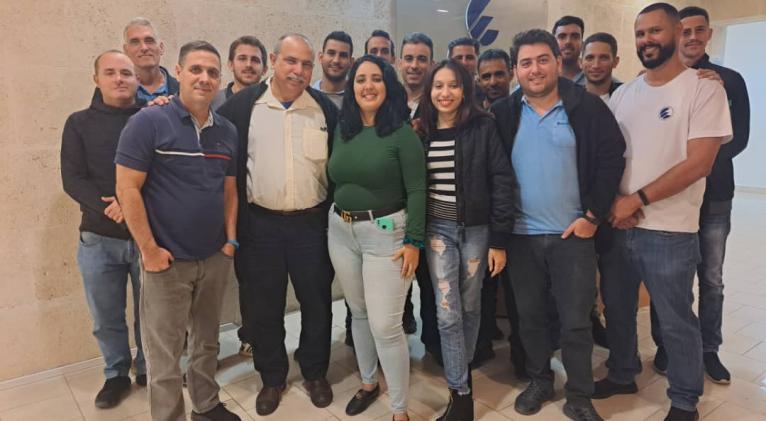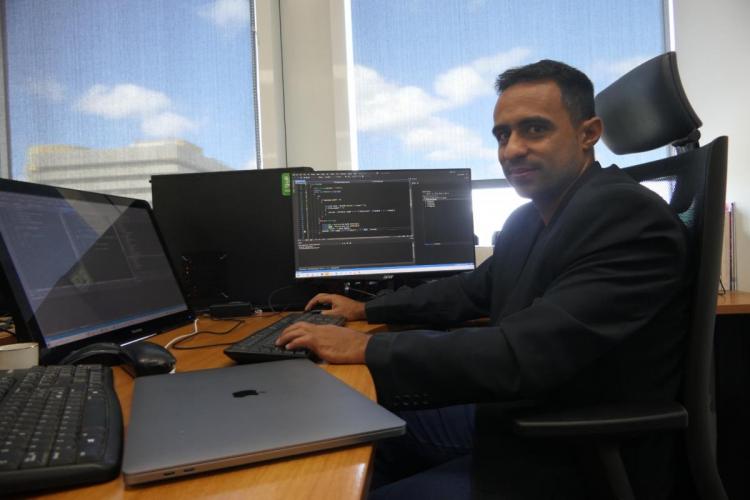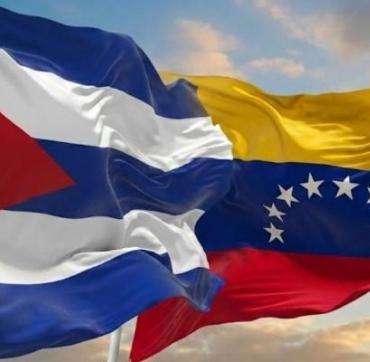The Transfermóvil Team, Without Plural Modesty
especiales

They are almost all very young and, each one, absolutely brilliant, but the first thing that surprises you when you enter that micro cosmos which is their offices, is the total sense of a team.
They speak almost all the time in plural, but it’s not the repeated plural of modesty, it’s the inevitable expression of someone who knows that "one tree does not make a forrest". Having just turned 9 years old was a good excuse to talk to some of these young people.
Sergio Díaz García: "here they encourage us to keep growing"

His current role within the team is "the development and support of different processes of new services the platform brings", perhaps when he arrived as a trainee a little over two years ago, he did not imagine that he would have so much responsibility, so soon, Or perhaps he sensed it from the first interview:
«Really, when you leave the University, as a young person, you have a desire to do, to look for an opportunity to develop everything you studied for five years. I had a brief interview with Julio, the leader of the project and, although at the beginning he didn’t have control or knowledge of everything that was done, simply what was worth it to them was the desire to do it. I think that when you come from a life as student the main thing is to be given the chance, and I had it, the other thing is to acquire knowledge and contribute something new.
«Here they encourage us to keep growing and I think that for a trainee it’s essential. Due to the flow of the platform and how the work is structured, one progresses and advances in different stages and, as you gain expertise, you are given responsibilities.
Sergio has many reasons to feel proud of the work he and his colleagues do: «Transfermóvil not only launches new services, technological improvements are also made to benefit more people; last year, for example, the function for the deaf and hearing impaired was added, that was a task because you had to put yourself in the situation of that group, you have to take everyone into account.
What he likes most about the team is “the dynamic we share, professionally and personally, everyone who arrives is assimilated into the team, we don't leave them out. We live life together beyond work: parties, meetings, we meet, we share. We are a family, really.
For this reason, Sergio prefers not to count the hours he dedicates to Transfermóvil: «It’s constant work, not only developing, programming, but also helping any neighbor, explaining how the platform works. They are direct work 9-10 hours a day, but we don’t see it as forced work, we do it because we know the commitment we have and because, in addition, we like what we do.
He doesn’t understand hypothetical situations in which work stops, he doesn’t believe it: "in any service situation we have to put ourselves in charge of solving it, we are a team, if one cannot, someone will be able to and will get on top of it".
Addrel Armengol: “the best thing is to know that what we’re doing is useful”

Addrel is 35 years old, ten older than his colleague Sergio, so he reached to the Transfermóvil team after other work experiences and assures: «Of all the projects I’ve been in, this is the most comprehensive, the one with the most users, in which we receive the most opinions, for me it’s the most important. We see the result of what was done at the moment, that forces us to do the
work as accurately as possible. In addition, I’ve had to learn many new things here, that I didn’t know in all those years of experience, for example, developing Android apps.
Addrel is involved into the development of the APK and the core, which is where all operations are processed. When he arrived, there were only two developers and he had to take over the job of one of them. He has seen the platform grow and also the team that makes it possible: "now it’s much better, because you can distribute the tasks more, dedicate more time to each one and, above all, more specialization."
Regarding the time they dedicate to Transfermóvil, he told us: «Usually, we are in the office, from 8 a.m. to 6 p.m. in the afternoon or so, but there are times when we leave here at 8 or 9 p.m., we have had to come on weekends, for example, when we released El Monedero, we spent months working until 9 and 10 p.m., because can you imagine, it was a full module.
However, that does not mean that they have already "left" the Monedero, as we Cubans usually say: "since we released it until now, we have included about 15 or 20 more operations, our work here is not something that you can say: ¨that’s it , I'm done¨, you have to update it and add things all the time." time".
The best thing about working in the Transfermóvil team: «knowing that what we’re doing is useful, it solves problems for many people. For example, when we had the stamps, we solved a real problem, something that was needed.
The most complex thing: «we have to be available at all times, sometimes they have woken us up at 3 in the morning and we’ve had to come here. We've all been at a party and we had to come here. "There is a very positive family atmosphere."
Yoelkys Beltrán Sánchez: Transfermóvil is here to stay

Yoelkys is in charge of the 15 young computer scientists, including two trainees, who make up the Development Department. What’s the key to preserving so much discipline and commitment in a group that does not reach 35 as the average age?
«The main key is that, in this Directorate, not only in the Department, the managers are totally technical rather than administrative bosses, so we mix with the boys and we are part of that team, that’s how they see us and, technically, we do the job os a specialist just like them. Furthermore, communication is very important within such a large team, we always transmit security and trust them."
He is a graduate from CUJAE, was the founder of UCI as a student assistant and has been working with ETECSA for 19 years. Yoerlkys arrived at Transfermóvil just a few months after the project began, so he has lived practically all of its moments:
«The first great satisfaction we had was when the service became popular. We started with some basic operations that could be done by typing short codes to perform some transactions and queries, that was published and began to become popular. As technology gained ground in the country, the need for the APK began, which made things much easier.
The biggest challenge: “to reach all clients we have and to ensure that the different areas that can use this development nest do so. "That’s the biggest challenge, but this also goes hand in hand with the number of services that are developed."
However, recently another challenge has put them to the test: "When the country was paralyzed during the pandemic, we had more work, because the need to make payment for virtual services was evident."
While we were all at home, Yoelkys and his colleagues did not stop going to the office: «Our life was quite complicated. First, everyone's fear, that is undeniable. Here we enforced the protocols to the letter and we did not get sick, even though we had very hard work throughout that period. We were one of the few authorized to circulate, even with a curfew and the three managers also became drivers, to bring and take everyone, it was necessary, because people were at home and had to pay for services without leaving their houses.
"At the time of the pandemic, the usefulness of the platform became visible, even though we never tired of talking about the advantages everywhere, that was when it was really understood and the exponential growth of users of the platform happened."
In fact, in the middle of the pandemic, he sometimes had to leave Artemisa, where his parents live, to attend to project emergencies. Why have you remained in such a demanding job for so long? is an easy question for Yoelkys to answer:

«I like what I do, I’m in love with the project... furthermore, this project, professionally, has no roof for development in the technological area, because it does not end with just doing it, it’s keep it, but technologies change and we have to update them, in other words, this is a project that’s here to stay.
Translated by Amilkal Labañino / CubaSí Translation Staff














Add new comment